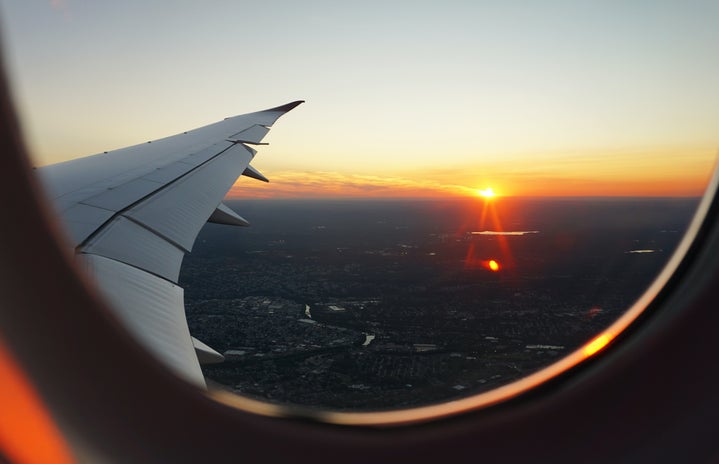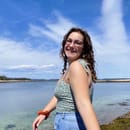From Maine to Bulgaria
Growing up, my dad always said, “It’s not an adventure until something goes wrong.” Luckily for me, I knew my study abroad experience would be one of the biggest adventures of my life because things started going wrong before the trip even began. As everyone knows, general life during the COVID-19 pandemic is not only inconvenient but also extremely mentally taxing and, at times, frightening. However, traveling during this pandemic heightens these feelings in a dramatic way, including new entry requirements for each country, masks making language barriers increasingly more difficult, and an abundance of delayed flights. My first week studying abroad in Blagoevgrad, Bulgaria has been stressful, overwhelming, and utterly life-changing in the best ways imaginable.
While spending the last week in the States with my family in Vieques, Puerto Rico, it was announced that Bulgaria had a new entry requirement which most importantly included a required PCR test within 72 hours of arriving in the country. The only problem was when I received the news, I was on an island without any testing facilities and I was already within the 72-hour limit. I eventually was able to get one the day before I left for Bulgaria, which was conveniently also the day I arrived home from Puerto Rico, though I knew the results would not come in time and I would have to quarantine upon arrival. First arriving in Boston, I was turned away due to updated entry requirements in Amsterdam, where my 3 hour layover would take place. This led me to staying with extremely kind family friends, albeit strangers, and running around Boston attempting to find any available test. Thankfully, after traveling and being awake for over 24 hours, delayed flights, and a frantic call to my doctor requesting a certificate of recovery, I arrived in Bulgaria with my negative test results, awaiting the adventure that was ahead. Since my arrival, I have experienced countless new places, foods, nightlife, and social norms that all revolve around Bulgarian culture.
Culture Shocks
One of the first things I faced within the few hours of being here was the culture shock. Previously hearing about culture shock, I was under the impression that it was bold, extremely apparent, and that it would take some time getting used to. However, I’ve come to realize that many of these “shocks” are rather just surprising observations that are sometimes inconvenient, but not life-altering. The biggest change from Maine that I have noticed so far is the stray animals: dogs and cats roam the streets day and night, all friendly, but very persistent in getting food or attention. From what I’ve learned so far, this problem can be attributed to the political corruption that comes with a post-communist state, and it’s a problem that won’t be able to be fixed without the proper funding and attention from the state itself. Many of these animals are tagged, signifying the vaccinations they have been given, but many remain untagged and roaming around the city.
Of course this was surprising to me, but the other side of this coin is that there are no homeless people. Bulgaria is a very family and people-oriented country, and with that comes certain values: there are shelters and apartments readily available to those who need them, and food and funding that comes from the state. It was definitely surprising to acknowledge the different problems that the U.S. compares to other countries, like Bulgaria, solely based on the values instilled in the government and culture.
New Experiences
During orientation week at the American University in Bulgaria, or AUBG, the exchange and first-year students were brought together to the Rila Monastery. Lying in the Rila mountains, this monastery is the largest in Bulgaria and dates back to the 10th century, founded by the hermit Saint John. Today, there are about 60 monks who still reside in this beautiful structure, and it continues to serve as a place to restore and maintain traditional Bulgarian culture and values. Of the several monasteries I have visited, this may have been the most extravagant design I have seen: walls and ceilings completely covered in extremely elegant and detailed paintings attributed to the saints, kings, and orthodox religion of Bulgaria; graves of past kings; beautiful, unique, and eccentric architecture; and one of my favorite aspects, homemade doughnuts which consisted of fried dough with various hot sauces dribbled over them. The immense history behind this monastery, and the culture it continues to uphold, was an incredible experience and introduction to Bulgaria.
The food in Blagoevgrad has also been one of the best experiences so far. Being a vegetarian here does prove to provide challenges, especially in restaurants without English menus(or any menus at all), but thankfully many of the traditional dishes are vegetarian to begin with. Including banitsa, shopska salad, and tarator, everything has been amazing. Banitsa, a pastry or bread layered with cheese and egg, is the perfect side dish to accompany virtually any meal, though it has proven to be difficult to find off campus. Shopska salad is Bulgaria’s national salad and represents the colors of the flag through the ingredients of cucumbers, tomatoes, peppers, onions, and feta cheese. Lastly, I’ve found that yogurt is an extremely prevalent ingredient in many Bulgarian recipes, including tarator: cold soup including yogurt, cucumbers, garlic, dill, and most importantly, walnuts. While this is traditionally a summer soup, it has been in many restaurants I’ve visited regardless of the snow outside, and is much better than what I was expecting from a cold soup made of yogurt.
Currently
As I spend more time at AUBG and in Blagoevgrad, I continue to experience more of the culture and the shocks that come with it. In the past week, I’ve only been surrounded by about 35 first-year and exchange students from all over the world. Having already made friends with students from Latvia, the Netherlands, Germany, Greece, Lithuania, and across the U.S., my hands are pretty full as I’m slowly learning about a plethora of different cultures. Classes have now started up, trips are being planned around Bulgaria, and I learn a bit more about the language and history of this country every day. In the next week, I’m interested in how the academics are at AUBG compared to what I’ve experienced in the past, how the social life of students interacts with the community, the general observation of the city I’m in, and of course more food. Довиждане!


